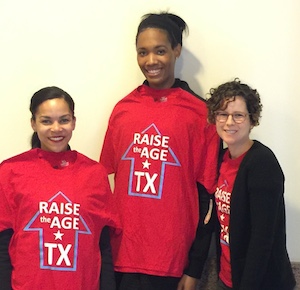
2017 Legislative Priority: Raise the Age of Juvenile Court Jurisdiction to 17
Updated: March 13, 2017
The Texas House Juvenile Justice & Family Issues Committee considered HB 122 (Dutton) on March 8, 2017, one of several “raise the age” bills filed in the House. The Committee heard testimony in support of the bill from advocates, district court judges, concerned parents, and several young people whose lives have been affected by their involvement at age 17 with the criminal justice system.

Lexus Cubero is one of these young people. Shuttled between foster homes, Lexus landed at a residential treatment center at 17, where she was bullied by other youth and staff. The bullying took its toll. One day, she kicked her bed and yelled that she wanted to hit a staff member with a stick. This outburst landed her in jail for over 90 days without anyone to bail her out. She spent the majority of the time in isolation after she became frightened of the adult offenders and asked to be moved. She was charged with criminal mischief and making a terroristic threat, which have hampered her ability to find stable employment and housing. Lexus told the Committee, “I don’t want other youth to go through what I have; I made a mistake as a kid.” She added that without a criminal record, she would be in a better place today.
Texas Appleseed presented data to the Committee which shows that the majority of 17-year-olds are arrested for low-level misdemeanor offenses at rates more similar to 16-year-olds than 18-year-olds – and that arrests are decreasing: The arrest rate for 17-year-olds is down 17% from 2013 to 2015. However, despite that fact that 16- and 17-year olds are arrested for similar offenses, 17-year-olds are jailed more often than 16-year-olds are detained. And while arrest rates for 17-year-olds have decreased, arrest rates for 16-year-olds have declined more drastically over the same period.
These differences underscore the primary differences between the adult and juvenile systems: in the adult system, there are far fewer opportunities to divert 17-year-olds away from developmentally inappropriate settings, and into research-based rehabilitative programs. In adult facilities, 17-year-olds are at greater risk of experiencing sexual and physical victimization. And treating 17-year-olds as adults increases the likelihood they will reoffend and that if they do reoffend, they will commit more serious offenses.
Lexus’ story illustrates the need to ensure that Texas’ 17-year-olds are given the same protections offered by the juvenile system. Texas Appleseed’s data analysis shows that we don’t have to fear treating 17-year-olds as juveniles. These youth don’t present a risk to public safety – and we can expect the same improvement in outcomes for 17-year-olds that we’ve seen for our younger youth.
Photo caption: Texas Appleseed's Morgan Craven (left) and Brett Merfish (right) attend the March 8 hearing with Lexus (center).
Original Post: January 27, 2017

This issue falls under our Children & Youth work.
Currently, all 17-year-olds are sent to the adult criminal justice system in Texas, regardless of the crime committed. Research tells us that these youth would be better served by the juvenile justice system, where they could receive education and services more likely to result in rehabilitation. Texas Appleseed supports legislation that would keep 17-year-olds in the juvenile justice system and out of adult jails and prisons.
For a full list of our priorities, click here.